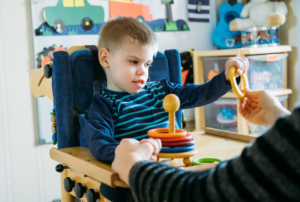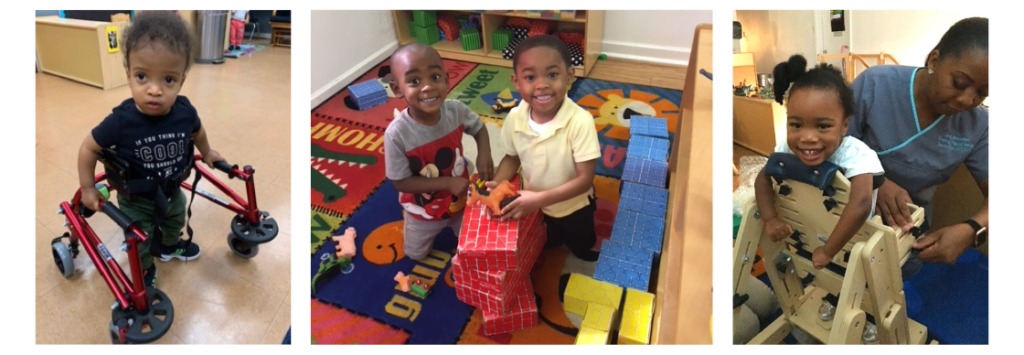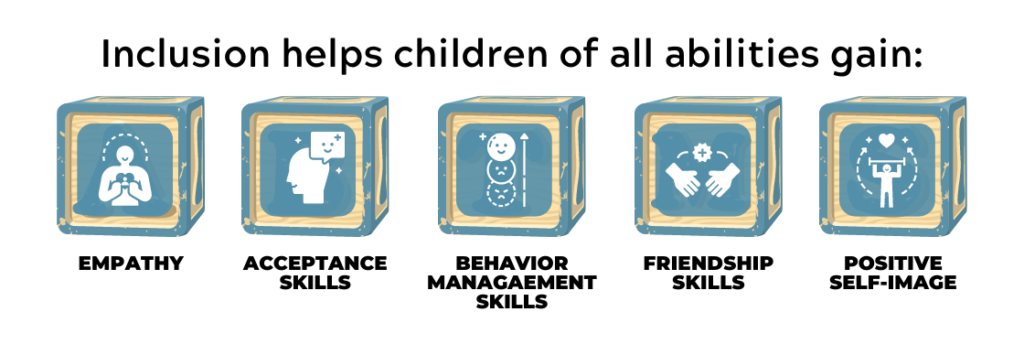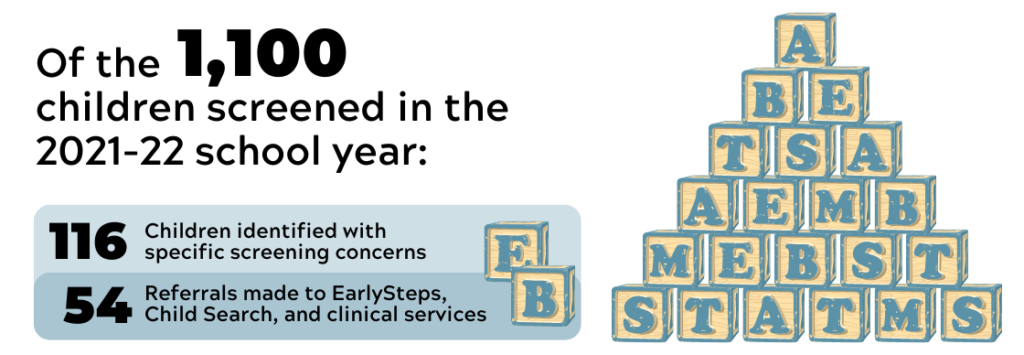IPEC’s Evidence Based Practices

The Human Development Center’s Early Childhood (EC) initiatives are leading by example, and aim to bring Early Childhood Evidence-Based Practices statewide.
Did you know approximately one in six children have a developmental disability diagnosis1?
Early and accurate identification of developmental delays helps families access services that support a child’s language, cognitive, motor, and social-emotional development. Early intervention may even reduce the need for intensive special education services later. As described by the CDC, early intervention can have a significant impact on a child’s ability to learn new skills, overcome challenges, and increase success in school and life2. One national study of children who participated in early intervention found that roughly one-third of infants and toddlers who received services were no longer considered to have a disability at entry into kindergarten3. Unfortunately, many infants and toddlers slip through the cracks and begin school without adequate supports.

The Human Development Center’s Inclusive Practices in Early Childhood (IPEC) utilizes evidence-based practices to help Louisiana early childhood programs identify delays in children aged 0-5, refer families to appropriate supports, and provide customized coaching for early childhood teachers. IPEC services include:
- Training – IPEC offers interactive group trainings featuring topics like Developmental Milestones, Evidence-Based Supports, Introduction to the Autism Spectrum, IFSP/IEP Basics, and more.
- Coaching – This job-embedded professional development includes classroom observation and consultation, shared planning and goal creation, and follow-up coaching. IPEC also offers Practice-Based Coaching, which is up to 8-weeks of intensive coaching cycles to support needs identified by IPEC specialist during consultation.
- Individualized Family Service Plan (IFSP) and Individualized Education Program (IEP) Support – Consultations are available to support family and early childhood providers to prepare for and attend IFSP/IEP meetings as well as helping implement the IFSP/IEP.
- Screening and Referral – IPEC supports programs to develop robust and accurate developmental screening and referral systems.
What is Evidence-Based Practices?
Evidence-based practices (EBP) are strategies proven to achieve positive outcomes by pulling together the best available research, expert knowledge, program data, and input from children and their caregivers4.
What are examples of Early Childhood EBPs?
- Early Intervention is key to the developmental success for children with delays;
- Universal Screening is vital to identifying young children for intervention and supports;
- Inclusive practices are beneficial to the developmental journey for all individuals, no matter their abilities; and
- Practice-Based Coaching, a cyclical process to support teachers through shared action planning and reflection, is the most effective practice that leads to positive outcomes for students.
Inclusive practices benefit all children in the classroom.
Inclusion helps young students both with and without disabilities gain friendship skills, enhance language and communication skills, understand and accept their similarities and differences, and develop important empathetic skills like positive interactions, patience, and kindness5.

Leading by example.
HDC EC initiatives are engaged in supporting early childhood programs. During the last school year, we:
- Processed over 1,100 developmental, behavioral, and autism screenings
- Provided follow-up on 116 specific screening concerns
- Completed 54 referrals to EarlySteps, Child Search, and clinical services based on screening results
- Trained over 120 teachers and administrators on inclusive practices
- Supported teachers with on-site consultation or coaching in over 20 inclusive classrooms
IPEC’s aim is to take inclusive practices statewide and become Louisiana’s leading experts in early childhood disability.

Sign-up for IPEC services today!
To sign-up for IPEC services, email earlychildhood@lsuhsc.edu.
References
- Zablotsky B, Black LI, Maenner MJ, Schieve LA, Danielson ML, Bitsko RH, Blumberg SJ, Kogan MD, Boyle CA. Prevalence and Trends of Developmental Disabilities among Children in the US: 2009–2017. Pediatrics. 2019; 144(4):e20190811.
https://pubmed.ncbi.nlm.nih.gov/31558576/ - CDC. (August, 2022). What is “Early Intervention”?. https://www.cdc.gov/ncbddd/actearly/parents/states.html
- Hebbeler, K., Spiker, D., Bailey, D., et al. (January, 2007). Early Intervention for Infants and Toddlers with Disabilities and their Families: Participants, Services, and Outcomes. SRI International. https://www.sri.com/wp-content/uploads/2021/12/neils_finalreport_200702.pdf
- Early Childhood Technical Assistance Center. (2020). Evidence-Based Practice. https://ectacenter.org/topics/evbased/evbased.asp
- Louisiana Department of Education. (2013). Early Childhood Inclusion: FOR ALL CHILDREN IN LOUISIANA [Brochure].https://www.louisianabelieves.com/docs/default-source/early-childhood/brochure—early-childhood-inclusion.pdf

 myLSUHSC
myLSUHSC